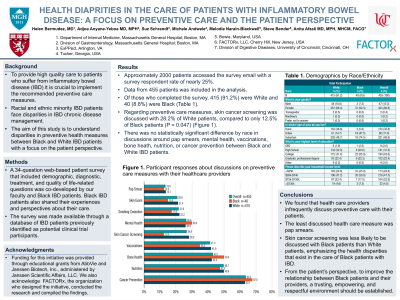Monday Poster Session
Category: IBD
P2116 - Health Disparities in the Care of Patients With Inflammatory Bowel Disease: A Focus on Preventive Care & the Patient Perspective
Monday, October 23, 2023
10:30 AM - 4:15 PM PT
Location: Exhibit Hall

Has Audio

Helen Bermudez, MD
Massachusetts General Hospital
Boston, Massachusetts
Presenting Author(s)
Adjoa Anyane-Yeboa, MD, MPH1, Helen Bermudez, MD1, Suz Schrandt, JD2, Melodie Narain-Blackwell, BA3, Steve Bender, BA4, Anita Afzali, MD, MPH, FACG5
1Massachusetts General Hospital, Boston, MA; 2ExPPect, LLC, Arlington, VA; 3Color of Crohn's and Chronic Illness, Rockville, MD; 4FactorX, Cherry Hill, NJ; 5University of Cincinnati College of Medicine, Cincinnati, OH
Introduction: Management of patients who suffer from Inflammatory bowel disease (IBD) requires preventative care. This high-quality care offered to patients improves health outcomes. Racial and ethnic minority IBD patients, as well as individuals from low socioeconomic backgrounds have been increasingly recognized to be affected by health disparities in chronic disease management. Thus, the aim of this study is to better understand disparities in care between Black and White IBD patients, with a focus on preventative health measures, while also integrating the patient’s perspective of their care.
Methods: A 34-question web-based patient survey that included demographic, diagnostic, treatment, and quality of life-related questions was conducted. The survey was made available through a database of IBD patients previously identified as potential clinical trial participants. The survey included 22 questions with closed answers, 10 questions with the opportunity to select "other" and provide additional information, and 2 open-ended questions.
Results: Approximately 2000 patients accessed the survey email. The survey respondent rate was nearly 25%, with data from 455 patients who completed the survey included in this analysis. Of those who completed the survey, 415 (91.2%) were White and 40 (8.8%) were Black (Table 1). In terms of preventive screenings, skin cancer screening was discussed with 26.8% of all IBD patients, and was discussed with 28.2% of White patients, compared to only 12.5% of Black patients (P = 0.047). The least frequently discussed topic amongst all IBD patients were pap smears (13.7% for White respondents, 12.5% for Black respondents). There was no statistically significant difference by race in discussions around pap smears, mental health, vaccinations, bone heath, nutrition, or cancer prevention between Black and White IBD Patients.
Discussion: We found that health care providers infrequently discuss preventative care for IBD with their patients. In our study, the least commonly discussed health care measure by providers were pap smears. From the patient’s perspective, to improve the relationship between Black patients and their providers, a trusting, empowering, and respectful environment should be established. Provider self-awareness including understanding their communication style is crucial when cultivating these interactions. Patients want to be able to take an active role in their care and feel empowered by their physicians to do so.

Disclosures:
Adjoa Anyane-Yeboa, MD, MPH1, Helen Bermudez, MD1, Suz Schrandt, JD2, Melodie Narain-Blackwell, BA3, Steve Bender, BA4, Anita Afzali, MD, MPH, FACG5. P2116 - Health Disparities in the Care of Patients With Inflammatory Bowel Disease: A Focus on Preventive Care & the Patient Perspective, ACG 2023 Annual Scientific Meeting Abstracts. Vancouver, BC, Canada: American College of Gastroenterology.
1Massachusetts General Hospital, Boston, MA; 2ExPPect, LLC, Arlington, VA; 3Color of Crohn's and Chronic Illness, Rockville, MD; 4FactorX, Cherry Hill, NJ; 5University of Cincinnati College of Medicine, Cincinnati, OH
Introduction: Management of patients who suffer from Inflammatory bowel disease (IBD) requires preventative care. This high-quality care offered to patients improves health outcomes. Racial and ethnic minority IBD patients, as well as individuals from low socioeconomic backgrounds have been increasingly recognized to be affected by health disparities in chronic disease management. Thus, the aim of this study is to better understand disparities in care between Black and White IBD patients, with a focus on preventative health measures, while also integrating the patient’s perspective of their care.
Methods: A 34-question web-based patient survey that included demographic, diagnostic, treatment, and quality of life-related questions was conducted. The survey was made available through a database of IBD patients previously identified as potential clinical trial participants. The survey included 22 questions with closed answers, 10 questions with the opportunity to select "other" and provide additional information, and 2 open-ended questions.
Results: Approximately 2000 patients accessed the survey email. The survey respondent rate was nearly 25%, with data from 455 patients who completed the survey included in this analysis. Of those who completed the survey, 415 (91.2%) were White and 40 (8.8%) were Black (Table 1). In terms of preventive screenings, skin cancer screening was discussed with 26.8% of all IBD patients, and was discussed with 28.2% of White patients, compared to only 12.5% of Black patients (P = 0.047). The least frequently discussed topic amongst all IBD patients were pap smears (13.7% for White respondents, 12.5% for Black respondents). There was no statistically significant difference by race in discussions around pap smears, mental health, vaccinations, bone heath, nutrition, or cancer prevention between Black and White IBD Patients.
Discussion: We found that health care providers infrequently discuss preventative care for IBD with their patients. In our study, the least commonly discussed health care measure by providers were pap smears. From the patient’s perspective, to improve the relationship between Black patients and their providers, a trusting, empowering, and respectful environment should be established. Provider self-awareness including understanding their communication style is crucial when cultivating these interactions. Patients want to be able to take an active role in their care and feel empowered by their physicians to do so.

Figure: Participants responses about discussions on preventive maintenance with their healthcare providers
I will not be adding any tables
Disclosures:
Adjoa Anyane-Yeboa: Janssen – Consultant. Pfizer – Grant/Research Support.
Helen Bermudez indicated no relevant financial relationships.
Suz Schrandt indicated no relevant financial relationships.
Melodie Narain-Blackwell: Abbvie – Independent Contractor. BMS – Advisory Committee/Board Member, Grant/Research Support. Gilead – Speakers Bureau. Janssen – Grant/Research Support, Independent Contractor. Lilly – Advisory Committee/Board Member. Medtronic – Speakers Bureau. Takeda – Advisory Committee/Board Member, Grant/Research Support, Independent Contractor.
Steve Bender indicated no relevant financial relationships.
Anita Afzali: AbbVie – Advisor or Review Panel Member, Advisory Committee/Board Member, Consultant, Grant/Research Support, Speakers Bureau. Bristol Myers Squibb/Celgene – Advisor or Review Panel Member, Advisory Committee/Board Member, Consultant, Grant/Research Support, Speakers Bureau. DiaSorin – Consultant. Eli Lilly – Advisor or Review Panel Member, Advisory Committee/Board Member, Consultant. Gilead – Advisor or Review Panel Member, Advisory Committee/Board Member, Consultant. IBD Horizons – Owner/Ownership Interest. Janssen – Advisor or Review Panel Member, Advisory Committee/Board Member, Consultant, Grant/Research Support, Speakers Bureau. Pfizer – Advisor or Review Panel Member, Advisory Committee/Board Member, Consultant, Grant/Research Support, Speakers Bureau. Takeda – Advisor or Review Panel Member, Advisory Committee/Board Member, Consultant, Grant/Research Support, Speakers Bureau. TLL Pharmaceuticals – Consultant.
Adjoa Anyane-Yeboa, MD, MPH1, Helen Bermudez, MD1, Suz Schrandt, JD2, Melodie Narain-Blackwell, BA3, Steve Bender, BA4, Anita Afzali, MD, MPH, FACG5. P2116 - Health Disparities in the Care of Patients With Inflammatory Bowel Disease: A Focus on Preventive Care & the Patient Perspective, ACG 2023 Annual Scientific Meeting Abstracts. Vancouver, BC, Canada: American College of Gastroenterology.
